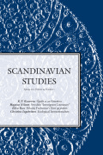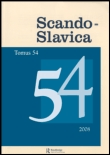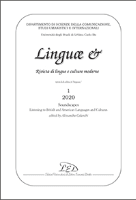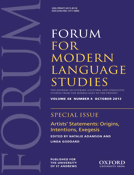
Lingue Antiche e Moderne
metrics 2024
Fostering Interdisciplinary Dialogue in Linguistics
Introduction
Lingue Antiche e Moderne is an esteemed open-access academic journal dedicated to the study of ancient and modern languages, published by UNIV STUDI UDINE. Since its inception in 2012, the journal has provided a platform for researchers, professionals, and students to disseminate groundbreaking studies and interdisciplinary research in linguistics and philology. With a commitment to accessibility, Lingue Antiche e Moderne encourages the sharing of knowledge across a global audience, ensuring that innovative ideas and historical insights are readily available to all. The journal plays a crucial role in advancing our understanding of linguistic evolution and cultural interchange, making it a vital resource for anyone interested in the dynamics of language through time. The ISSN for the journal is 2281-4841, ensuring its recognition in the academic community. Researchers and contributors are invited to engage with this vibrant discourse while enriching their own scholarly endeavors.
Metrics 2024
 -
- 0.10
0.10 0.20
0.20 -
-Metrics History
Rank 2024
JCI (Web Of Science)
Quartile History
Similar Journals

Revista de Filologia Alemana
Uncovering the Intricacies of Language and LiteratureRevista de Filologia Alemana, published by Universidad Complutense de Madrid, serves as a vital platform for scholarly dialogue in the fields of Linguistics and Literature. With its origins dating back to 1996, this peer-reviewed journal provides insights and critical analyses that foster a deeper understanding of German philology and its broader implications. Although categorized in Q4 across both Linguistics and Literary Theory as of 2023, the journal represents a growing contribution to academic discourse, aiming to enhance knowledge and promote research within these domains. Although it does not currently offer open access, the journal continues to attract submissions from both established scholars and emerging researchers, thereby ensuring a diverse range of perspectives. With Scopus rankings highlighting its position within the academic landscape, Revista de Filologia Alemana is essential for anyone looking to delve into the intricate relationships between language and literature.

Linguistica e Filologia
Illuminating the Ties Between Language and Culture.Linguistica e Filologia is a prominent academic journal published by UNIV DEGLI STUDI BERGAMO that offers an Open Access platform since 2002, fostering scholarly communication in the fields of linguistics, philology, and comparative literature. With a commitment to advancing understanding in these disciplines, the journal serves as a vital resource for researchers, professionals, and students alike. Its content encompasses diverse theoretical and empirical studies, critiques, and analyses of language and literature, encouraging interdisciplinary dialogue. Hosted in the picturesque city of Bergamo, Italy, the journal aims to bridge gaps between historical and contemporary linguistic practices, enhancing the global discourse on language studies. With a focus on quality, transparency, and accessibility, Linguistica e Filologia plays a crucial role in shaping the future of linguistic scholarship and is an invaluable reference for anyone interested in the intricate relationships between language and culture.

GERMANISCH-ROMANISCHE MONATSSCHRIFT
Connecting Cultures through Scholarly ExplorationGERMANISCH-ROMANISCHE MONATSSCHRIFT, published by UNIVERSITATSVERLAG C WINTER HEIDELBERG GMBH, is a vital academic journal dedicated to the fields of linguistics, literature, and literary theory. With its ISSN 0016-8904, this journal fosters scholarly discussions and disseminates innovative research that intersects Germanic and Romance languages and literatures. While it does not currently offer Open Access options, its contributions have positioned it within the Q4 quartile in both Linguistics and Language, and Literature and Literary Theory according to the 2023 category rankings. The journal's Scopus ranking reflects its emerging place within the academic community, situated at the 40th percentile for Literature and Literary Theory, and the 20th and 18th percentiles within Language and Linguistics, respectively. Scholars and students are encouraged to engage with this resource as it offers a platform for new perspectives that are pivotal to understanding the complex interrelations of these linguistic traditions, enriching both teaching and research initiatives.

SCANDINAVIAN STUDIES
Exploring the Depths of Scandinavian Culture and LanguageSCANDINAVIAN STUDIES is a prestigious journal dedicated to advancing the understanding of Scandinavian languages, literature, and culture. Published by the Society for the Advancement of Scandinavian Studies in the United States, this journal has been a key resource for scholars since its inception in 1974, covering a breadth of topics in both Linguistics and Literary Theory. With an impactful presence within academic circles, it has achieved a notable ranking in the Q2 category for Literature and Literary Theory, and Q3 for Linguistics and Language, ensuring its relevance among leading journals in the humanities. The journal is indexed in reputable databases, including Scopus, where it ranks in the 65th percentile for literature studies. Although it is not open access, SCANDINAVIAN STUDIES provides critical insights and scholarly contributions that greatly enhance discourse in Scandinavian studies. Researchers, professionals, and students alike will find this journal a valuable tool for deepening their understanding of the rich tapestry of Scandinavian contributions to world culture.

Scando-Slavica
Exploring the Intersections of Nordic and Slavic CulturesScando-Slavica is a renowned academic journal published by ROUTLEDGE JOURNALS, TAYLOR & FRANCIS LTD, specializing in the rich interplay of Scandinavian and Slavic studies. With its ISSN 0080-6765 and E-ISSN 1600-082X, the journal has been a critical resource for scholars since its inception in 1954, covering a wide range of disciplines including archaeology, cultural studies, history, linguistics, and literature. As of 2023, it has consistently ranked in the third quartile across various categories, indicating its influential role in disseminating innovative research within the arts and humanities. With a focus on interdisciplinary dialogue, Scando-Slavica aims to foster a deeper understanding of cultural exchanges and linguistic connections, making it an essential read for researchers, professionals, and students interested in exploring the complexities of Nordic and Slavic interactions. While currently not an open access journal, its contributions have garnered substantial citations, bolstering its academic impact and relevance in a diverse scholarly landscape.

Studia z Filologii Polskiej i Slowianskiej
Illuminating the Nuances of Slavic LanguagesStudia z Filologii Polskiej i Slowianskiej is a prominent journal published by the Polish Academy of Sciences, Institute of Slavic Studies, focusing on the rich and diverse field of linguistics and language studies, particularly within the Slavic context. With the ISSN 0081-7090 and E-ISSN 2392-2435, this open-access journal has been a valuable resource for researchers, professionals, and students since its transition to an open-access model in 2014. It features rigorous peer-reviewed articles that contribute to the understanding of linguistic phenomena and cultural narratives across Slavic languages. Recognized within the Q3 quartile of linguistics and language in 2023, it ranks at the intersection of arts, humanities, and social sciences, providing insights that echo through disciplines such as sociolinguistics, psycholinguistics, and philology. In its ongoing publication trajectory from 2011 to 2023, Studia z Filologii Polskiej i Slowianskiej continues to foster academic discourse and collaboration, positioning itself as a key player in the global linguistic community.

Linguae &-Rivista di Lingue e Culture Moderne
Unlocking the Rich Tapestry of Modern Linguistic DiversityWelcome to Linguae &-Rivista di Lingue e Culture Moderne, an esteemed open-access journal dedicated to the interdisciplinary exploration of modern languages and cultures. Published by LED EDIZIONI UNIV, this journal has been a vital resource since 2002, fostering scholarly dialogue and promoting research across various aspects of linguistics, literature, and cultural studies. With its ISSN 2281-8952 and E-ISSN 1724-8698, Linguae aims to connect researchers, professionals, and students by providing a platform for innovative ideas and critical analyses. Although currently lacking a designated HIndex and Scopus ranking, its commitment to quality and academic rigor makes it a significant contributor to the field. The journal’s open-access policy ensures that its rich array of articles and research findings are readily available to a global audience, promoting an inclusive academic environment. Join an engaged community of scholars by reading and submitting to Linguae, where the vibrant interplay of languages and cultures is thoroughly examined.

MODERNA SPRAK
Connecting Researchers and Educators in Language ScienceMODERNA SPRAK, published by LMS-Modern Language Teachers Association, is a vital journal in the field of linguistics and language studies that has been contributing to academic discourse since its inception in 2002. With an ISSN of 2000-3560, this Swedish journal provides a platform for researchers, educators, and language enthusiasts to explore contemporary issues and advancements in linguistics. Despite its Q4 category ranking in the 2023 category quartiles, its focus on diverse linguistic perspectives and innovative methodologies ensures its continued relevance and importance. As of 2023, it holds notable ranks within Scopus, placing it within the lower percentile of its categories—yet this offers a unique opportunity for emerging scholars to contribute to its growth and visibility. While MODERNA SPRAK is not an open access journal, it serves as a rich resource for academic networking and knowledge sharing in the evolving landscape of language education and research. The journal's commitment to fostering scholarship within an inclusive framework makes it an essential read for those engaged in the language sciences across various educational contexts.

Language and Linguistics
Innovating Insights into Language DynamicsLanguage and Linguistics is a leading academic journal published by ACAD SINICA, INST LINGUISTICS, based in Taiwan. Established in 2008, this journal has rapidly gained recognition within the field of linguistics, achieving a commendable ranking of Q2 in the 2023 category quartiles and holding positions in the top percentiles of Scopus rankings for both Arts and Humanities and Social Sciences. With an ISSN of 1606-822X and an E-ISSN of 2309-5067, the journal aims to foster the development of linguistics research by providing a platform for the dissemination of innovative and interdisciplinary studies. While it currently operates on a traditional subscription model, its significant contribution to the advancement of linguistic theory and its applications makes it an invaluable resource for researchers, professionals, and students alike. Spanning converged years from 2008 to 2024, Language and Linguistics continues to shape the dialogue in understanding language phenomena and encourages submissions that push the boundaries of current linguistic knowledge.

FORUM FOR MODERN LANGUAGE STUDIES
Elevating Research in Literature and LinguisticsFORUM FOR MODERN LANGUAGE STUDIES is a prestigious academic journal published by Oxford University Press that has been serving the fields of literature and linguistics since its inception in 1965. This journal, with an ISSN of 0015-8518 and an E-ISSN of 1471-6860, plays a crucial role in advancing scholarly discourse on modern language studies, including literature and literary theory. With an impactful presence in both the linguistic and literary domains, it has been recognized in 2023 with a category ranking of Q2 in Literature and Literary Theory and Q3 in Linguistics and Language. It stands out in the competitive landscape, holding a notable position within Scopus rankings, including a 70th percentile ranking in Literature & Literary Theory. While the journal currently does not offer open access options, it remains a vital resource for researchers, educators, and students passionate about the transformative power of language and literature. Its commitment to quality research and robust academic discussion underscores its importance, making it a key platform for those aiming to contribute to modern language scholarship.